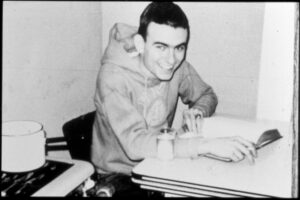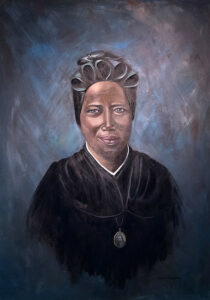Another day, another heart-wrenching matchup between two saintly souls. Today it's Jonathan Daniels vs. Josephine Bakhita.
Yesterday, Blandina swept past Brendan of Clonfert 59% to 41% to advance to the Elate Eight where she'll face Joanna the Myrrhbearer.
Remember to read the comments and perhaps even comment yourself! There is a wealth of information that gets shared by the Lent Madness Global Voting Public and it's always fun and faithful to see where the conversation goes. Not to mention the occasional limerick, poem, and hymn dedicated to our two competing saints.
Vote now!
Jonathan Myrick Daniels
 “We have spent four years in preparation for SOMETHING. What that something is, who we are, we do not know.”
“We have spent four years in preparation for SOMETHING. What that something is, who we are, we do not know.”
So began Jonathan Daniel’s valedictory address to the Virginia Military Institute, class of 1961. Jonathan wasn't a natural fit for military school; friends said “Jon was gentle, intellectual, and undisciplined,” known to skip class and get caught smoking. As a Yankee, he was nonplussed by VMI’s annual memorial for Confederate alumni, and his classmates singing “Dixie.” Yet Jonathan admired his father, who served as a military physician. He withstood the hazing and learned to appreciate the grueling training. (He also kept a bottle of J&B scotch in a hollowed-out dictionary of the Civil War).
In his field education with Episcopal Theological School, Jon saw the realities of racism and poverty up close for the first time. He wrote to his sister, “Christians must learn a little better the way of the cross. Somehow this is where God and life and love are – and where triumphant.” In 1965, after spending a week in Alabama with classmates, Jonathan felt he had to return. “Something had happened to me in Selma, which meant I had to come back,” he wrote. “I could not stand by in benevolent dispassion any longer without compromising everything I know and love and value. The imperative was too clear, the stakes too high, my own identity was called too nakedly into question … I had been blinded by what I saw here (and elsewhere), and the road to Damascus led, for me, back here.”
Working with the Student Nonviolent Coordinating Committee, Jonathan registered voters, tutored children, distributed food and clothing, and even drove people to medical appointments. He enjoyed getting to know people, talking, laughing, and learning about their lives. “He had an abundance of strength that came from the inside that he could give to people,” SNCC organizer Stokely Carmichael said. Jon described standing nose-to-nose with a policeman at a protest: “I snarled something at him…that managed to be both defensive and self-righteous. We matched baleful glances and then both looked away. And then came a moment of shattering internal quiet, in which I felt shame, indeed, and a kind of reluctant love for the young policeman.” His friend asked the young man his name (Charlie), and the group sang to him that they loved him.
With a small group, Jon spent weeks trying to integrate worship at St. Paul’s Episcopal Church. Upon learning that the Bishop of Alabama, Charles Carpenter, supported St. Paul’s, Jon took the lead on crafting a statement. “The Carpenter of Birmingham must not be allowed to forever deny the Carpenter of Nazareth.”
When a sheriff’s deputy leveled his shotgun at 17-year-old Ruby Sales, Jonathan leapt to push her out of the way. She has spent her life as a human rights advocate, and told NPR “[Jon] walked away from the king’s table. He could have had any benefit he wanted, because he was young, white, brilliant, and male.”
Could he tell us, Jonathan might say he chose to sit at his King’s table. Shortly before he died he wrote, “I lost fear [of Selma] when I began to know in my bones and sinews that I had been truly baptized into the Lord's death and Resurrection, that in the only sense that really matters I am already dead, and my life is hid with Christ in God.”
Josephine Bakhita
 Josephine Bakhita was a Sudanese girl who lived much of her life in slavery, but when she finally won her freedom, she used that freedom to embrace a life of Christian service as a nun in Italy.
Josephine Bakhita was a Sudanese girl who lived much of her life in slavery, but when she finally won her freedom, she used that freedom to embrace a life of Christian service as a nun in Italy.
Josephine was captured as a girl in the Sudan, near what we know as Darfur today. One story told about her suffering during this time is that one enslaver drew patterns on her skin with flour, traced them with a sharp blade, and then rubbed salt into the wounds to cause scars. This sounds incredibly painful—and it also sounds like the traditional practice of scarification which was historically practiced by the tribes of Sudan, until the European Christian missionaries arrived and outlawed it. In reading Josephine’s story, it is difficult to tell if the reason for her scars was meant to be an unholy torture, or a rite of passage in the culture she grew up in, or both. Our world is complex and painted in tones of grey.
Perhaps equally indicative of Josephine’s suffering, however, is the fact that she remained in bondage in the Sudan, and indeed, throughout 7 years in Italy, all while slavery was in fact against the law. And yet no one intervened on her behalf. Particularly when she was transferred to government officials in the Italian colonial government, no one thought enough of her as a human being to notice that she was enslaved, until she asked the nuns for help.
When she was a nun in Italy, however, that seems to have changed. She was so beloved by the locals in her little town, as she worked the door at the abbey that they called her “little brown sister” and attributed their safety through World War II with her prayers and protection (thought at one point she seems to have been mistaken for a spy because of her skin color.) She was especially loved by the children of the village, who called her “Mother Moretta” and “Universal Sister.”
In Italy, her name is invoked frequently around projects that serve refugees and migrants. She is the patron saint of the Sudan, and human trafficking survivors. When she was canonized, Pope John Paul II said “The history of her life inspires not passive acceptance but the firm resolve to work effectively to free girls and women from oppression and violence and to return to them their dignity in the full exercise of their rights.”
Josephine Bakhita via Flickr
85 comments on “Jonathan Myrick Daniels vs. Josephine Bakhita”
I wonder about the accuracy of the voting because today and Tuesday the choice had the saint whose write-up was first listed second and the second write-up listed first.
I wish these two saints had not been competing against each other: they both are worthy.
Sometimes I get very cynical and hopeless and think, "Well, after 2,000 years of Christianity the world really does NOT look like the Kingdom Jesus taught us about. What difference had it made, really?" And I get distraught over the current rise of "White Christian Nationalism" and seeing this hateful, perverse ideology claim my Christ and hurt my country.
Then, when I read today's life of Jonathan Daniels, I felt so deeply how his love of Jesus and commitment to the Way did change the world. And if he did what he did, what is it I'm supposed to be doing?
I honor Josephine Bakhita, but Jonathan Daniels's witness really makes me examine my own life and provides an example of what a committed Christian can do.
I was committed to Jonathan Myrick Daniels until I got to the JPII quotation at the end of Josephine Bakhita's writeup: "The history of her life inspires not passive acceptance but the firm resolve to work effectively to free girls and women from oppression and violence and to return to them their dignity in the full exercise of their rights.” Those rights are currently more threatened than ever by numerous groups and movements around the world. I know Jonathan will probably win, though, and deservedly so, given that he accomplished exactly that through the sacrifice of his own life.
I voted for Jonathan because…….no greater love has a man that he lay down his life for his friends.
Very gut-wrenching today.
In the end I chose Jonathan because he seemed so led by the Holy Spirit and willing to follow. I see his story here as what happens when we trust our journey to being led by the Holy Spirit. Sure, its not the outcome many would set themself up for but I believe he _chose_ to follow the example of Jesus here. Wrenching all the way around.
This is a tough one. Literally a goin toss
Human bondage takes many forms. It can be physical, mental, emotional. It can be inflicted by others or ourselves. It can be as simple as choosing the wrong career, or in the case of St. Jonathan Myrick Daniels, entering and remaining in the wrong educational program. It can be complex, as it was for St.Josephine Bakhita, born into a culture that did not recognize slavery as human bondage. What release there is for Christians "hid with Christ in God."
After reading about Jonathon Myrick Daniels putting himself between a sherriff deputy's leveled gun to push Ruby Sales, a human rights advocate out of the way and save her life I had to vote for him.
I wanted to read through the comments before I voted as I was undecided.
I finally made up my mind and now the vote button has disappeared in Safari on my iPhone.
So, I tried FireFox on my iPhone and it says the website is unsecured and won’t load it.
So, I tried Safari on my MacBook but I got, [quote] Safari Can’t Open the Page Safari can’t open the page. The error is: “The operation couldn’t be completed. (kCFErrorDomainCFNetwork error 303.)”. (kCFErrorDomainCFNetwork error : 303).[unquote]
Ugh.
So, I tried Firefox on the MacBook, and got, [quote]Request Header Fields Too Large The server refused this request because the request header fields are too large.[unquote]
Downloaded and installed Chrome on my MacBook and finally got to vote!
Maybe if the SEC puts Saint Isidore of Seville, Patron Saint of the Internet, in the bracket next year then some of these Internet problems with LentMadness will disappear.